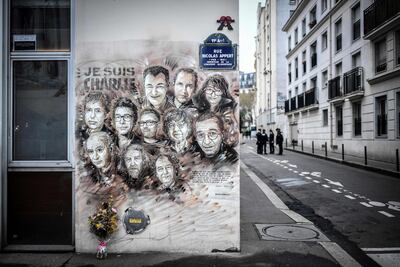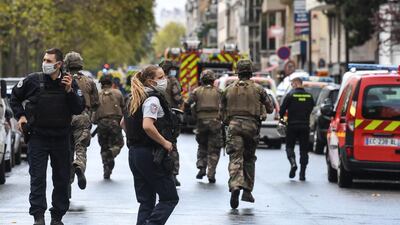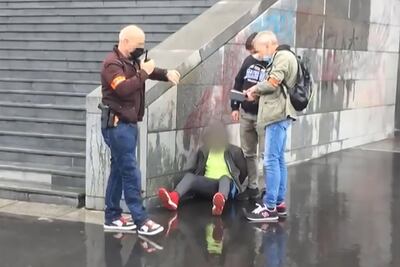A 25-year-old Pakistani immigrant has been charged with the attempted murder of two journalists stabbed outside the former offices of the magazine Charlie Hebdo in an attack underlining a rising terrorism threat in France.
Prosecutors say Zaheer Hassan Mahmoud, who initially claimed to be 18 and to have arrived in France as a minor, admits carrying out the attack after being enraged by the magazine's republication of cartoons depicting the Prophet Mohammed.
He allegedly made two reconnaissance visits in the days leading up to last Friday's attack in Paris but had no idea Charlie Hebdo had moved premises after the 2015 massacre of 12 people, including journalists, cartoonists and a Muslim police officer.
The wounded man and a woman worked for a Premieres Lignes, a television production company unconnected to the magazine. They suffered serious facial injuries when attacked by a man wielding a butcher’s knife as they took a cigarette break in the street but their lives are not in danger.
The attack coincided with the trial in Paris of 14 people accused of providing logistical support to the French-Algerian Kouachi brothers, Cherif and Said, and an accomplice, Amedy Coulibaly, before their three-day wave of terror left 17 innocent victims dead five years ago.
The Kouachis were responsible for the Charlie Hebdo killings while Coulibaly murdered a young policewoman and later four people he took hostage at a Jewish supermarket. All three killers were shot dead by police
French terrorist menace 'growing in strength'
The latest attack reflects gathering tension in France as the high-profile trial proceeds.
Laurent Nunez, France’s national intelligence and counter-terrorism co-ordinator told France-Inter radio that the terrorist menace was “growing in strength”. “We have seen on social media more and more calls for violence on social media and propaganda from Al Qaeda and Islamic State [ISIS].”
Before being killed by police, the brothers tried to justify their murders as revenge for their previous publication by the magazine.Although Mahmoud is suspected of acting alone, Al Qaeda on the Arabic Peninsula (Aqap), the group to which the Kouachis pledged allegiance, had already warned that Charlie Hebdo faced further reprisals after reprinting the cartoons.
The injured television journalists were not the only victims of mistaken identity when the attacker struck in the 11th arrondissement of Paris last week.
Only hours after the French far right had blamed lax immigration policies, an Algerian man without residential status and initially treated as the attacker’s accomplice was hailed “a hero” for trying to detain him.
Identified as Youssef, 33, he was proved after 10 hours in custody to have been entirely innocent.
He was wrongly thought to be an accomplice after pursuing the attacker with the intention of detaining him having heard the cries of the victims.
When he confronted the man on a Metro station platform, police misinterpreted the encounter – caught on video surveillance film – as a sign they knew each other.
Youssef’s lawyer, Lucie Simon, wrote on Twitter: “The second suspect was none other than a hero who tried to stop the assailant.
"He presented himself to police as a witness but was handcuffed, hooded and placed under arrest despite witnesses and video film. He emerged exhausted and shocked.”
But Youssef was philosophical, telling French media: “I wanted to be a hero and ended up behind bars … I’m not angry at the police, they were doing their job. If something like it happened again, I’d do the same.”
Some of the reaction to Youssef’s arrest, his initial portrayal as a terrorist suspect and his subsequent exoneration, highlighted divisions in French society.
Ms Le Pen asked how many victims of terrorism would have been saved by stricter control on immigration policy and systematic deportation.
But her comment preceded news that the Algerian immigrant had acted courageously in an attempt to detain the attacker.
A supporter of Marine Le Pen’s far-right, anti-immigration party National Rally tweeted that he only acted as a hero to improve his chances of being granted the right to stay in France.
During in the ensuing social media debate, one French Maghrebin was equally ill-informed, accusing French television of ignoring Youssef's gesture. In fact, Ms Simon told The National she had received 200-300 approaches from all media forms, French and foreign, seeking interviews with her client.
She said Youssef had no right under French law to compensation for being arrested and questioned but declined to say if she would seek another form of official recognition of his actions.
Suspect's real name and age unearthed by investigators
Mahmoud is said by prosecutors to have given his name when arrested as Hassan Ali. He arrived in France with a younger brother three years ago, when he was treated as a minor unaccompanied by an adult.
The authorities already suspected he was older but a judge refused to authorise a bone test to determine his true age.
His real name came to light as investigators studied his mobile phone. They also where they also found he had used social media before the attack to broadcast a video in his native Urdu, supporting the theory of a premeditated act.
No link with Al Qaeda or ISIS has been established and he was unknown to intelligence services. It seems likely he was influenced by television images of angry protesters on the streets of Pakistan calling for revenge against the "wretches" of Charlie Hebdo.
The trial of alleged accomplices of the Kouachi brothers and Coulibaly is examining the roles of those alleged to have provided support including arms and vehicles. The court has heard harrowing testimony from survivors of the attacks and relatives of the dead.
The mother of Clarissa Jean-Philippe, the murdered policewoman, said: “I am looking for the truth. For me, the person most responsible is the one who supplied the weapon.”
Her daughter’s killer, Coulibaly, told a witness at the scene, identified as Mathis, as he tried to intervene: “You want to play. You’re going to die.” He survived because Coulibaly’s gun jammed.
Jeremy Ganz, a central heating engineer caught up in the attack during a maintenance visit, described his desperate but unsuccessful efforts to save a shot colleague. He recalled “the smell of blood replacing that of the firearm powder”.

Fouzia Merabet said his brother, Ahmed, finished off by one of the Kouachis as he lay on the ground, had been “so proud of his uniform”.
The trial is expected to continue until mid-November. The accused faced between ten years’ imprisonment and life sentences if convicted.



